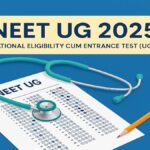In a landmark move set to redefine school-level assessments, the Central Board of Secondary Education (CBSE) has announced the introduction of Open Book Exams (OBE) for Class 9 students, beginning with the 2026-27 academic year. This major overhaul is part of CBSE’s strategic push to shift the focus from rote memorization to holistic, application-based learning.
What is the CBSE Open Book Exam Pattern?
An Open Book Exam is an assessment format where students are permitted to consult their textbooks, notes, and other approved materials during the test. The objective is not to test memory, but to evaluate a student’s ability to:
- Understand and interpret information.
- Apply concepts to solve complex problems.
- Analyze situations with critical thinking skills.
The CBSE new exam pattern will feature questions designed to assess Higher-Order Thinking Skills (HOTS), making it impossible to find direct answers in the study material.
The Rollout Plan: Subjects and Timeline
This CBSE assessment reform will be implemented in a phased manner to ensure a smooth transition for students and teachers.
- Pilot Phase (2025-26): A trial run of the OBE format will be conducted in select CBSE schools to gather feedback and fine-tune the process.
- Official Launch (2026-27): The Open Book Exam for Class 9 will be officially rolled out nationwide.
- Initial Subjects: In its first phase, the OBE format will be applied to key subjects, including Science, Social Science, and English.
Based on the success and feedback from the initial implementation, CBSE may consider extending this format to Class 10 and senior secondary classes in the following years.
Why This Is a Game-Changer for Indian Education

This initiative marks a significant step towards modernizing India’s educational framework. The key benefits include:
- Reduced Exam Stress: By removing the pressure of memorizing vast amounts of information, the focus shifts to conceptual understanding, leading to lower anxiety among students.
- Encouraging Deeper Learning: The OBE system promotes application-based learning, bridging the gap between theoretical knowledge and its practical, real-world application.
- Alignment with Global Standards: This move aligns the CBSE curriculum with international educational practices, as open-book assessments are common in countries like the USA, UK, and Singapore.
How Can Students Prepare for the New Format?
Success in the CBSE Open Book Exams will require a new approach to studying. Students should focus on:
- Conceptual Clarity: Instead of memorizing facts, strive for a deep understanding of every topic.
- Practice Analytical Questions: Work on case studies and problem-solving questions that require you to apply knowledge.
- Time Management: While you can use books, exams will still be time-bound. Practice quickly locating relevant information and formulating well-structured answers.
This forward-thinking step by CBSE promises to foster a generation of critical thinkers and problem-solvers, equipped with skills for the 21st century.




